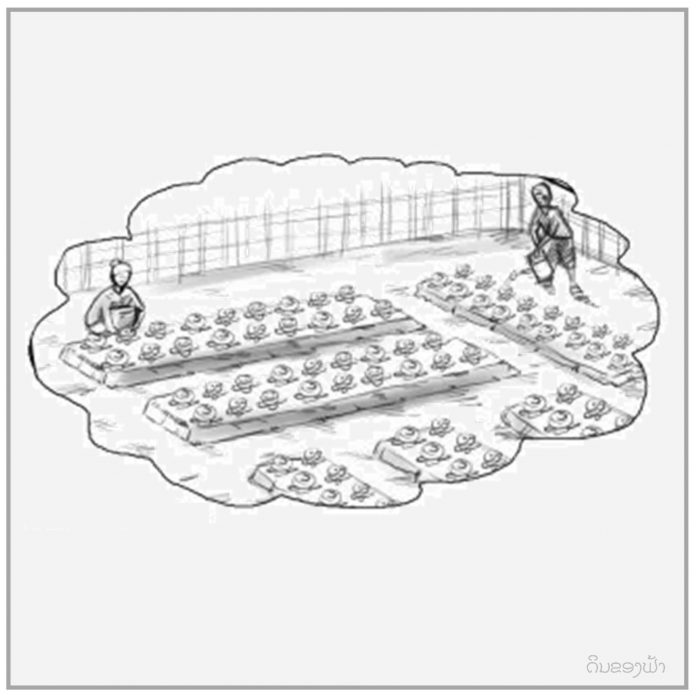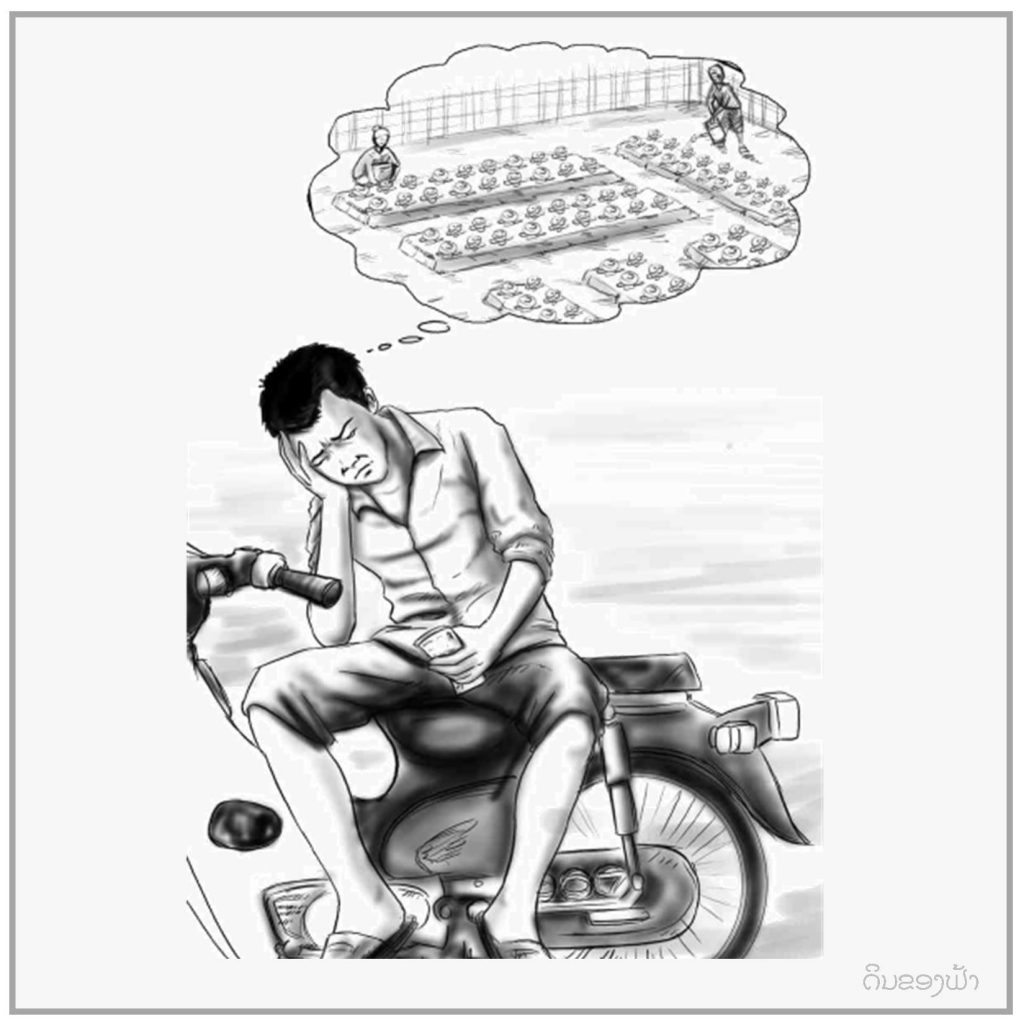
Sylikhan Keophouthong
The atmosphere in Somphorn’s garden is cool and refreshing. The air is clear and full of natural fragrance. The garden is very important to Somphorn’s family as it provides the main source of income. He, his wife and eighteen-year-old daughter have planted cabbages in this garden. They water it every day and keep a careful check on weeds, bugs and other insects. Due to their continuous efforts they are able to sell their produce, though they receive only a meagre amount of money in return. Sadly, this income is not enough to cover the cost of living, or the construction of their two-storey house. For this reason, Somphorn decides to seek work with the Community Development Agency, leaving the garden to the care of his wife and daughter. He reasons he will have time to help them put up fences, weed or take the cabbages to the market on weekends. This will only happen if the Community Development Agency does not send him to outlying communities.
“When our daughter grows up and has a family, I will give her all the gardening responsibilities,” Somphorn says to his wife.
“Don’t speak of the future too soon. Let’s look for money to finish this house first,” his wife cautions him.
“I am looking for money right now. I just don’t know where to find any,” he says.
One day, a passing vegetable wholesaler visits their garden.
“Oh! Your cabbage garden is beautiful! What kind of fertiliser do you use?”, wholesaler asks.
We grow these cabbages organically. We use only compost,” Somphorn’s wife answers, wiping the sweat off her cheeks.
“I’ve come from the town, and would like to buy cabbages for the market at the border,” the female merchant tells them.
“Well, your timing is good. We are about to take some to the market,” their daughter says with delight.
“I will buy a lot, but you must give me a good price,” says the woman.
“How many kilos do you want?” Somphorn’s wife asks.
“Well, if we agree on the right price, I will buy the lot.”
Mother and daughter look at each other. They have never imagined that somebody would want to buy all the cabbages in one lot. They whisper to each other for few minutes, annoying the merchant.
“Look let’s do this, and not haggle too much. I will pay six million for your crop,” she says loudly.
“Mum, do you want to take six million for all this?” the daughter asks, ignoring the trader’s impatient tone.
“I don’t know what to say. Telephone your father and ask him what he thinks.”
Her daughter takes out her mobile from her pocket and speaks to her father...
“Mum…Dad says ten million,” she calls to her mother who is talking to the merchant.
“What! Ten million is too much,” the trader blanches. “Let’s agree on seven million.”
“Telephone your father again,” the mother instructs.
Daughter follows her mother instruct.
“Dad says eight million, otherwise no deal,” the daughter tells the two women who are waiting for the answer.
The wholesaler tries to bargain the price down to seven and a half million but Somphorn’s wife stands firm. In the end, the merchant agrees to buy all the cabbages for eight million, knowing it is a bargain.
After the sale, Somphorn comes to help prepare the empty garden so that a new crop can be planted. They make plans to spend the money from the sale of the cabbages. Five million will go to buying building materials and hiring workers to finish the house, and since Somphorn has not visited his in-laws for three years, another two million will be spent on bus tickets to Savanakhet and gifts for the relatives.
A week later, when they return from Savannaket, Somphorn and his wife take their motorbike out to the garden to see about planting the next lot of cabbages. When they arrive at the gate, they see a picture of devastation. Their garden is now a flat expanse of red dirt scarred with the tracks of a bulldozer.
“Who bulldozed our vege¬table garden?” Somphorn’s wife screams in shock.
They go around asking the neighbours.
“I heard that a company has investment rights to plant rubber trees. It was they who bulldozed your land,” a young man says.
“This is not right! They act like this country has no law and order. Whatever it takes, I will fight to get my land back,” Somphorn exclaims angrily.
Back home, he is very worried and thinks hard about how to get his land back. If the company takes possession of the land, there will be no source of income for his family. After a lot of thinking, he decides to see someone at the local council office, who tells him to talk to the provincial office. At the provincial office, he is told to see the company director. The next day, Somphorn goes to see the director but is told he has gone overseas, and will be back after a week. A week passes and Somphorn goes back to the company office. This time he meets the director.
“Your company has bulldozed my garden and taken over my land. I want it back,” Somphorn begins.
“Our company was given permission to invest in this area. We saw that the land was neglected and nothing was planted there, so we decided to clear it,” the man explains.
“Now we are preparing the land for planting", Somphorn responses.
"We were given access to your land and other suitable land around it”, the man responses.
“Your company must give my land back. My family’s livelihood depends on it,” Somphorn argues loudly.
“Go and talk to the provincial officials, because they are the ones who allowed us to invest in this land,” the director replies.
Sensing that there won’t be any agreement, Somphorn goes back home very frustrated. He is so despondent that he does not feel like eating or drinking. He goes to see his friends and relatives for advice. He wastes more time and money chasing the matter. Eventually the last of the money from the sale of the cabbages is spent. His bad luck is compounded, for when he goes back to work, he is fired for being absent for so many days without sanctioned leave. Running around, trying to get his land back has cost him his job and his money. All these events compound Somphorn’s depression.
Two days later, he and his wife go back to their garden, and see that it, along with the neighbouring land, has been fenced off with barbed wire. The stakes which marked the boundaries of their garden have been ripped out and nothing remains to indicate it is theirs.
Somphorn does not give up and continues to look for ways of getting his land back. A month passes before Somphorn goes again to see the company director.
“I have come to ask for my land back because the season for planting cabbages is approaching. We need access to our land so please give it back,” Somphorn pleads.
“I have told you already that you must take this up with the provincial officials,” the company manager says angrily.
“I’ve already been there, and was told to come here and reach an agreement with the company,” Somphorn replies.
“In that case, let’s do this. We don’t want any complications. How about we compensate you ten million kip for any losses you have incurred?” the company director offers.
Somphorn is quiet for few minutes, not knowing what to do. He thinks that if he doesn’t take this money now, he might not get anything at all later on.
“Ten million isn’t enough. Can’t you offer more?”
“Ten million is a generous offer. Many people did not even get that much.” It is clear that the director has made his final offer.
Again, Somphorn thinks very carefully, worried that he might end up with nothing. In the end, he has no choice but to accept the offer. He takes the bundle of cash and leaves the office. Sitting on his motorbike, he looks at the money again. He holds a handful of fifty-thousand kip bills. He wonders how best to spend the money. First of all, he wants to finish his house so that it will be ready to welcome his future son-in-law. But after that how will he be able to support his family in the future? He looks up at the sky and asks the sacred spirits above, “Is the land my parents left behind for me worth only ten million kip?”

Reference: 'The Land Of the Sky', Written by young writers from Paksong elementary school', 2012


